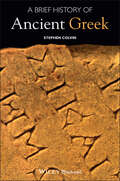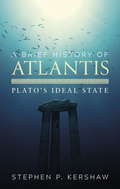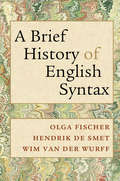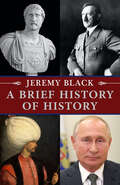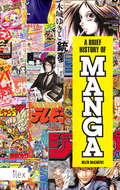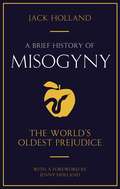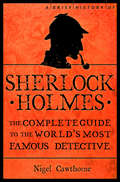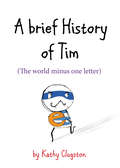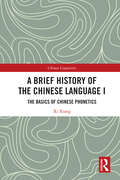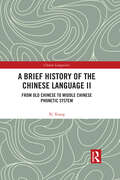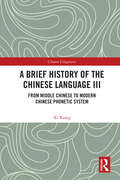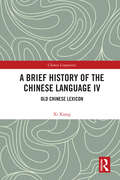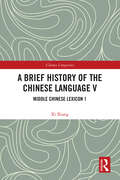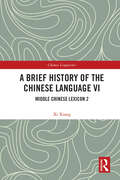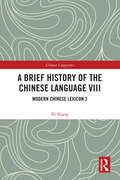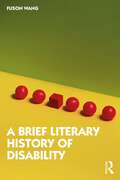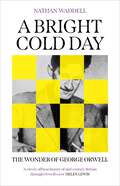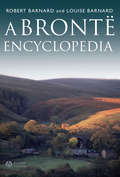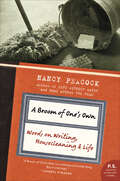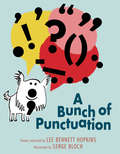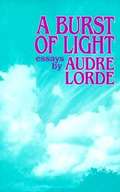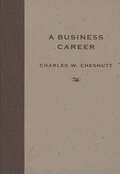- Table View
- List View
A Brief History of Ancient Greek (Wiley Brief Histories of the Ancient World)
by Stephen ColvinA Brief History of Ancient Greek accessibly depicts the social history of this ancient language from its Indo-European roots to the present day. Explains key relationships between the language and literature of the Classical period (500 - 300 BC) Provides a social history of the language which transliterates and translates all Greek as appropriate, and is therefore accessible to readers who know little or no Greek Written in the framework of modern sociolinguistic theory, relating the development of Ancient Greek to its social and political context Reflects the latest thinking on subjects such as Koiné Greek and the relationship between literary and vernacular Greek
A Brief History of Atlantis: Plato's Ideal State (Brief Histories)
by Dr Stephen P. KershawThe Atlantis story remains one of the most haunting and enigmatic tales from antiquity, and one that still resonates very deeply with the modern imagination. But where did Atlantis come from, what was it like, and where did it go to?Atlantis was first introduced by the Greek philosopher Plato in two dialogues the Timaios and Kritias, written in the fourth century BC. As he philosophises about the origins of life, the Universe and humanity, the great thinker puts forward a stunning description of Atlantis, an island paradise with an ideal society. But the Atlanteans degenerate and become imperialist aggressors: they fight against antediluvian Athens, which heroically repels their mighty forces, before a cataclysmic natural disaster destroys the warring states. His tale of a great empire that sank beneath the waves has sparked thousands of years of debate over whether Atlantis really existed. But did Plato mean his tale as history, or just as a parable to help illustrate his philosophy?The book is broken down into two main sections plus a coda - firstly the translations/commentaries which will have the discussions of the specifics of the actual texts; secondly a look at the reception of the myth from then to now; thirdly a brief round-off bringing it all together.
A Brief History of English Syntax
by Olga Fischer De Smet Hendrik Wurff Wim Van DerIn its 1500-year history, the English language has seen dramatic grammatical changes. This book offers a comprehensive and reader-friendly account of the major developments, including changes in word order, the noun phrase and verb phrase, changing relations between clausal constituents and the development of new subordinate constructions. The book puts forward possible explanations for change, drawing on the existing and most recent literature, and with reference to the major theoretical models. The authors use corpus evidence to investigate language-internal and language-external motivations for change, including the impact of language contact. The book is intended for students who have been introduced to the history of English and want to deepen their understanding of major grammatical changes, and for linguists in general with a historical interest. It will also be of value to literary scholars professionally engaged with older texts.
A Brief History of History
by Jeremy BlackIn A Brief History of History, acclaimed historian Jeremy Black seeks to reinvigorate and redefine our ideas about history. The stories we tell about the past are a crucial aspect of all cultures. However, while the traditional storytelling process—what we think of as "history" in the proper sense—is useful, it is also misleading, not least because it leads to the repetition of bias and misinformation. Black suggests that the conventional idea of history and historians is constructed too narrowly, as it fails to engage with the broad nature of lived experience. By focusing on a singular idea or story within the history being explored, we fail to understand the interconnectivity of the everyday experience. A Brief History of History challenges accepted norms of the historical perspective and offers a view of human history that will surprise many and (perhaps) infuriate some. But above all, it is a history of historians written for this moment in time, a time when the traditional Eurocentric approach to history now appears wholly inappropriate.
A Brief History of Manga: The Essential Pocket Guide To The Japanese Pop Culture Phenomenon
by Helen MccarthyManga is more than a genre in the comics field: it is a vital creative medium in its own right, with hundreds of millions of readers worldwide, a host of graphic styles, and a rich history now spanning seven decades. Now for the first time, that history is told by an award-winning expert in the field. Covering topics from Akira to Mazinger Z, this book is fully illustrated throughout, and photos of key creators accompany accessible sidebars and timelines. The text is chronological, telling the story of Manga from its early-20th-century origins to its global dominance. Timelines relate key publications to events in Japanese and World history, and frequent sidebars give short biographies of key creative figures. Answering the key questions of any fan - where did my favourite manga come from, and what should I read next? - this book will open doors to neophytes and experts alike. Fans of manga and anime will: - discover the stories behind their favorite manga creator - be inspired by the history of the medium and its genre - find new manga to read and fall in love with
A Brief History of Misogyny: The World's Oldest Prejudice
by Jack HollandIn this compelling, powerful book, highly respected writer and commentator Jack Holland sets out to answer a daunting question: how do you explain the oppression and brutalization of half the world's population by the other half, throughout history? The result takes the reader on an eye-opening journey through centuries, continents and civilizations as it looks at both historical and contemporary attitudes to women. Encompassing the Church, witch hunts, sexual theory, Nazism and pro-life campaigners, we arrive at today's developing world, where women are increasingly and disproportionately at risk because of radicalised religious belief, famine, war and disease. Well-informed and researched, highly readable and thought-provoking, this is no outmoded feminist polemic: it's a refreshingly straightforward investigation into an ancient, pervasive and enduring injustice. It deals with the fundamentals of human existence -- sex, love, violence -- that have shaped the lives of humans throughout history. The answer? It's time to recognize that the treatment of women amounts to nothing less than an abuse of human rights on an unthinkable scale. A Brief History of Misogyny is an important and timely book that will make a long-lasting contribution to the efforts to improve those rights throughout the world.
A Brief History of Misogyny: The World's Oldest Prejudice (Brief Histories)
by Jack HollandIn this compelling, powerful book, highly respected writer and commentator Jack Holland sets out to answer a daunting question: how do you explain the oppression and brutalization of half the world's population by the other half, throughout history? The result takes the reader on an eye-opening journey through centuries, continents and civilizations as it looks at both historical and contemporary attitudes to women. Encompassing the Church, witch hunts, sexual theory, Nazism and pro-life campaigners, we arrive at today's developing world, where women are increasingly and disproportionately at risk because of radicalised religious belief, famine, war and disease. Well-informed and researched, highly readable and thought-provoking, this is a refreshingly straightforward investigation into an ancient, pervasive and enduring injustice. It deals with the fundamentals of human existence -- sex, love, violence -- that have shaped the lives of humans throughout history. The answer? It's time to recognize that the treatment of women amounts to nothing less than an abuse of human rights on an unthinkable scale. A Brief History of Misogyny is an important and timely book that will make a long-lasting contribution to the efforts to improve those rights throughout the world.
A Brief History of Sherlock Holmes
by Nigel CawthorneCreated by Sir Arthur Conan Doyle in 1887, Sherlock Holmes appears in four novels and fifty-six short stories. Although Holmes was not the first literary detective, he continues to have a perennial allure as the ultimate sleuth. As Holmes is being re-introduced to a new audience through TV and film, Cawthorne introduces the general reader to Holmes and his creator Arthur Conan Doyle. He gives a full biography of author as well as his creation, including his resurrection following his unlikely death at the hands of arch enemy, Moriarty. Cawthorne also surveys the world of Holmes, looking at Victorian crime, the real characters behind Dr Watson and Inspector Lestrade, as well as the world on the doorstep of 22b Baker Street.
A Brief History of Sherlock Holmes (Brief Histories)
by Nigel CawthorneCreated by Sir Arthur Conan Doyle in 1887, Sherlock Holmes appears in four novels and fifty-six short stories. Although Holmes was not the first literary detective, he continues to have a perennial allure as the ultimate sleuth. As Holmes is being re-introduced to a new audience through TV and film, Cawthorne introduces the general reader to Holmes and his creator Arthur Conan Doyle. He gives a full biography of author as well as his creation, including his resurrection following his unlikely death at the hands of arch enemy, Moriarty. Cawthorne also surveys the world of Holmes, looking at Victorian crime, the real characters behind Dr Watson and Inspector Lestrade, as well as the world on the doorstep of 22b Baker Street.
A Brief History of Tim: The World Minus One Letter
by Kathy ClugstonRather than explaining our origins, A Brief History of Tim addresses our history and culture at the levelwe most deeply desire - the trivial. By simply removing one letter, the world is tweaked with immensely enjoyable results:For those who think contemporary art is a load of rubbish, there's the Tat Modern. Find out about the Ancient Geeks, nerdy types who spent far too much time doing maths.A Brief History of Tim is laugh-out-loud funny and will have you looking at the world through fresh eyes.
A Brief History of the Chinese Language I: The Basics of Chinese Phonetics (Chinese Linguistics)
by Xi XiangAs the first volume of a multi-volume set on Chinese phonetics, this book gives a full picture of the historical development of the Chinese language and studies the phonetics of the early form of Chinese, i.e. Old Chinese.Chinese language history is generally split into three phases: 1) Old Chinese, the form of the Chinese language spoken between the 18th century BC and the 3rd century AD, 2) Middle Chinese, between the 4th century AD to around the 12th century AD, and 3) Modern Chinese, since the 13th century. In this volume, the author first introduces basic issues in Chinese language study, including research objectives, methodology, existing scholarship, periodization, and the distinctive linguistic characteristics of each period. The core chapters then describe and analyze the phonetical systems of Old Chinese, covering the initials system and related eight aspects, two types of rhyme groups, ancient finals, and the tonal system.This comprehensive groundwork on Chinese phonetical history will be a must read for scholars and students studying Chinese language, linguistics and especially for those wishing to become acquainted with Old Chinese phonetics.
A Brief History of the Chinese Language II: From Old Chinese to Middle Chinese Phonetic System (Chinese Linguistics)
by Xi XiangAs the second volume of a multi-volume set on Chinese phonetics, this book examines the phonetical systems of Middle Chinese and phonetical changes from Old Chinese to Middle Chinese.Chinese language history is generally split into three phases: 1) Old Chinese, the form of the Chinese language spoken between the 18th century BC and the 3rd century AD, 2) Middle Chinese, between the 4th century AD to around the 12th century AD, and 3) Modern Chinese, since the 13th century. This volume studies the phonological system of Middle Chinese, including the initials system, finals system, and tonal system, examining the evolution of these systems from the period of Old Chinese to that of Middle Chinese.This comprehensive groundwork on Chinese phonetical history will be a must read for scholars and student studying Chinese language, linguistics and especially for beginning learners of Middle Chinese phonetics.
A Brief History of the Chinese Language III: From Middle Chinese to Modern Chinese Phonetic System (Chinese Linguistics)
by Xi XiangAs the third volume of a multi-volume set on Chinese phonetics, this book examines the phonetical system of Modern Chinese and phonetical changes from Middle Chinese to Modern Chinese.Chinese language history is generally split into three phases: (1) Old Chinese, the form of the Chinese language spoken between the 18th century BCE and the 3rd century CE, (2) Middle Chinese, between the 4th century AD to around the 12th century CE, and (3) Modern Chinese, since the 13th century. This volume studies the phonetical systems of Modern Chinese, including the initials system, vowel final system, nasal final system, entering final system, and tonal system. The author discusses the distinct change of these systems from the period of Middle Chinese to that of Modern Chinese and studies the formation of the standard pronunciation of the common language of the modern Han nation.This comprehensive groundwork on Chinese phonetical history will be a must read for scholars and student studying Chinese language, linguistics, and especially for beginning learners of Modern Chinese phonetics.
A Brief History of the Chinese Language IV: Old Chinese Lexicon (Chinese Linguistics)
by Xi XiangAs the fourth volume of a multi-volume set on the Chinese language, this book studies the lexical system of Old Chinese and the development of different types of lexicons during the period. Focusing on lexicons in Old Chinese, the early form of the Chinese language used between the 18th century BCE and the 3rd century CE, this volume first introduces the methods of word formation in Old Chinese by analyzing words inscribed in oracle bones of the Shang Dynasty. Illustrated with examples, it then examines the lexical features of Old Chinese and explores the progress and evolutionary features of monosyllabic words, polysyllabic words, lexical meanings, synonyms, and idioms and proverbs over the course of the volume.This comprehensive groundwork on Chinese lexical history is a must-read for scholars and students studying ancient Chinese language, linguistics, and especially for beginning learners of the Old Chinese lexicon.
A Brief History of the Chinese Language V: Middle Chinese Lexicon 1 (Chinese Linguistics)
by Xi XiangAs the fifth volume of a multi-volume set on the Chinese language, this book studies the development of monosyllables and polysyllables in Middle Chinese and the overall evolution of lexical meanings during the period.Focusing on lexicons in Middle Chinese, the Chinese language used between the 4th century AD and the 12th century AD, the book first introduces the monosyllabic neologisms of Middle Chinese, including characters and words derived from Old Chinese lexicons and those newly created. It then examines the development of polysyllabic words in Middle Chinese, ranging from single morpheme words, tautologies and compound words. The final chapter discusses the changes and extension of word meanings in medieval Chinese.Illustrated with abundant examples, this comprehensive groundwork on Chinese lexical history will be a must read for scholars and students studying ancient Chinese language, linguistics and especially for beginning learners of the Middle Chinese lexicon.
A Brief History of the Chinese Language VI: Middle Chinese Lexicon 2 (Chinese Linguistics)
by Xi XiangAs the sixth volume of a multi-volume set on the Chinese language, this book studies the influence of foreign culture on Middle Chinese lexicon and the development of synonyms, idioms and proverbs during the period.Focusing on lexicons in Middle Chinese, the middle form of the Chinese language used between the 4th century AD and the 12th century AD, this book first analyzes loanwords in Middle Chinese, a product of cultural exchange with western regions on the silk road and the impact of Buddhism. It then discusses the differences in meaning between monosyllables and polysyllables. The final chapter describes enriching idioms and proverbs and the major sources of words, including classical works, Buddhist texts and the spoken language.Illustrated with abundant examples, this comprehensive groundwork on Chinese lexical history will be a must read for scholars and students studying ancient Chinese language, linguistics and especially for beginning learners of the Middle Chinese lexicon.
A Brief History of the Chinese Language VIII: Modern Chinese Lexicon 2 (Chinese Linguistics)
by Xi XiangAs the final volume of a multi-volume set on the Chinese language, this book studies the Western and Japanese influence on the lexicon of Modern Chinese, lexical developments in synonyms, idioms and proverbs in modern times, and lexical developments in contemporary times.This volume first introduces the influence of foreign cultures on the modern Chinese lexicon with an emphasis on loanwords from Japanese and Indo-European languages. It then discusses the synonyms, idioms and proverbs of Modern Chinese, elucidating their evolution, sources and composition. The final part centers on the development of the Chinese lexicon after the May 4 Movement in 1919, marking the beginning of the contemporary phase of the Chinese language. The author analyses trends and types of neologisms and loanwords and analyzes the blend of Mandarin and dialect words as well as the necessity of lexical standardization.Illustrated with abundant examples, this comprehensive groundwork on Chinese lexical history will be a must read for scholars and students studying modern Chinese language, linguistics and especially for beginning learners of modern and contemporary Chinese lexicon.
A Brief Literary History of Disability
by Fuson WangA Brief Literary History of Disability is a convenient, lucid, and accessible entry point into the rapidly evolving conversation around disability in literary studies. The book follows a chronological structure and each chapter pairs a well-known literary text with a foundational disability theorist in order to develop a simultaneous understanding of literary history and disability theory. The book as a whole, and each chapter, addresses three key questions: • Why do we even need a literary history of disability? • What counts as the literature of disability? • Should we even talk about a literary aesthetic of disability? This book is the ideal starting point for anyone wanting to add some disability studies to their literature teaching in any period, and for any students approaching the study of literature and disability. It is also an efficient reference point for scholars looking to include disability studies approaches in their research.
A Bright Cold Day: The Wonder of George Orwell
by Nathan WaddellA pioneering biography of George Orwell told through moments of everyday life 'A clever, offbeat history of mid-century Britain through George Orwell&’s eyes.' Helen Lewis When we think about Orwell, we imagine an angular, moustachioed sceptic crouched over a typewriter, who – between puffs on his cigarette – composes effortless streams of prose, unadorned but explosive. We see a man with &‘Important Things to Say&’ about: the slow creep of authoritarianism; the consequences of all-seeing tech; the fragility of truth. Much less often do we see him as a person caught up in the business of everyday life. And yet Orwell&’s work thrums with the quotidian: the smell of boiled cabbage, the chill of an unheated flat in early spring, the rumbling of old pipes. A Bright Cold Day reveals how the principles that govern us begin in the mundane. From waking and showering to breakfast, work, lunch, the pub, sleep and dreaming, Orwell was never dulled to the routines of living. And in the details of the day, we can understand how power, money, freedom and choice play out, not just for Orwell&’s literary characters, but for us all. *** 'An astute and intimate portrait of George Orwell.' Dorian Lynskey, author of The Ministry of Truth 'Beautifully written... urgent and compelling.' Emma Smith, author of Portable Magic
A Bronte Encyclopedia
by Robert Barnard Louise BarnardA Brontë Encyclopedia is an A- Z encyclopedia of the most notable literary family of the 19th century highlighting original literary insights and the significant people and places that influenced the Brontës' lives.Comprises approximately 2,000 alphabetically arranged entriesDefines and describes the Brontës' fictional characters and settingsIncorporates original literary judgements and analyses of characters and motivesIncludes coverage of Charlotte's unfinished novels and her and Branwell's juvenile writingsFeatures over 60 illustrations
A Broom of One's Own: Words on Writing, Housecleaning & Life (P. S. Series)
by Nancy PeacockFor the twice-published novelist, reading an article about herself in the National Enquirer—under the headline "Here's One for the Books: Cleaning Lady Is an Acclaimed Author"—was more than a shock. It was an inspiration.In A Broom of One's Own, Nancy Peacock, whose first novel was selected by the New York Times as a Notable Book of the Year, explores with warmth, wit, and candor what it means to be a writer. An encouragement to all hard-working artists, no matter how they make a living, Peacock's book provides valuable insights and advice on motivation, craft, and criticism while offering hilarious anecdotes about the houses she cleans.
A Bunch of Punctuation
by Lee Bennett HopkinsSelected by noted anthologist Lee Bennett Hopkins, this collection of all-new poems is written from the points of view of personality-filled punctuation marks, and is a memorable introduction to grammar for kids (adults, too!)In this land of punctuation, the exclamation mark is a superhero who tells a story chock-full of bops and bams, the comma lets you pause to enjoy the weather, and the period is where you must come to a full stop--or else the Grammar Police will get you. With humor and imagination, A Bunch of Punctuation makes it easy to remember the jobs of the various punctuation marks. Award-winning poet and anthologist Lee Bennett Hopkins has compiled a unique collection of poems featuring brand-new works by well-known poets, accompanied by inventive artwork by illustrator Serge Bloch.
A Burst of Light
by Audre LordeIn 1984, feminist poet Lorde learned that her breast cancer had metastasized to the liver. The moving title section comprises a series of journal excerpts that both frighten and inspire: choosing not to have a biopsy, she instead treats the disease with a stay at the homeopathic Lukas Klinik in Switzerland, consultations with more traditional medical specialists and alternatives like self-hypnosis. Her lifelong battle against racism, sexism and homophobia has armed her with the resilience to resist cancer, and thus "A Burst of Light" becomes not only a chronicle of Lorde's fight against disease, but a view of one woman's sparring with injustice, whether the oppressors are the South African police, the American government or malignant cells within her own body. Although it rings out with passion, anger and hope, the lengthy title piece is sometimes rambling and repetitive. In refreshing contrast, three outstanding essays on black lesbianism, the parallels between South Africa and the United States, and lesbian parenting are politically specific and pithy. -Publishers Weekly
A Business Career
by Charles W. ChesnuttNever before published, A Business Career is the story of Stella Merwin, a white woman entering the working-class world to discover the truth behind her upper-class father's financial failure. A “New Woman” of the 1890s, Stella joins a stenographer's office and uncovers a life-altering secret that allows her to regain her status and wealth. When Charles W. Chesnutt died in 1932, he left behind six manuscripts unpublished, A Business Career among them. Along with novels of Paul Laurence Dunbar, it is one of the first written by an African American who crosses the color line to write about the white world. It is also one of only two Chesnutt novels with a female protagonist. Rejecting the novel for publication, Houghton Mifflin editor Walter Hines Page encouraged Chesnutt to try to get the book in print. “You will doubtless be able to find a publisher, and my advice to you is decidedly to keep trying till you do find one,” he wrote. Page clearly saw that in A Business Career Chesnutt had written a successful popular novel grounded in realism but one that exploits elements of romance.
